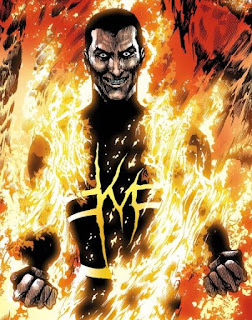In Marvelman, Alan Moore seeks to establish a benign global dictatorship because man can't be trusted to make its own decisions. This is in contrast to Moore's V For Vendetta, where the hero creates anarchy to build choice for the people.
BLACK and white reprints of Fawcett's Captain Marvel were extremely popular in post-war Britain for L. Miller & Son. When Fawcett ceased publishing the title off the back of their lawsuit by DC over Captain Marvel's similarities to Superman - who they were typically out-selling - Mick Anglo created Marvelman for the London-based publisher as a replacement. The whimsical adventures of Micky Moran - who becomes Marvelman when he shouts "Kimota!" - and sidekicks Young Marvelman and Kid Marvelman, could never foresee the troubles to come. When Alan Moore revived the strip for an adult sensibility in the Warrior launch of 1982, it was the start of a decades-long pit of rights-issues and insider frictions. Eclipse started to reprint colourised stories in 1985, calling their comic Miracleman to avoid legal compaints from Marvel, who would eventually reprint the run themselves.
Within the comics Bronze Age (1970 - 1985), the influence of underground comix and shifting political tides meant that the medium was increasingly aimed at adults, exploring topics such as drugs and racism. By the mid-1980's, the growth of comic shops and direct distribution spawned the Modern Age; pessimistically it was also a Dark Age, a perfect storm for experimental writers, artists and publishers. Moore was the pioneer of deconstructing characters, in this case taking Anglo's light-hearted and downright silly Marvelman family - and their mad scientist nemesis Gargunza - into the unchartered territories of modern London. Gargunza was now an ex-Nazi agent, Moran an overweight unhappily married man, and Kid Marvelman - Johnny Bates - the sadistic head of Sunburst Cybernetics. As Moore explains in the then superhero-waning world, "the idea of taking something as innocent and charming and harmless as Marvelman and dumping him in Mrs Thatcher's Britain - there was something poignant about that ... for all that it was a reinvention, there was an element of epitaph as well."
 Here's Johnny! “Having exhausted all the humdrum cruelties known to man quite early in the afternoon, [Kid Miracleman] had progressed to innovations unmistakably his own.” During Bates' apocalyptic attack on London, the evil super-god is seen even reverting to cannibalism.
Here's Johnny! “Having exhausted all the humdrum cruelties known to man quite early in the afternoon, [Kid Miracleman] had progressed to innovations unmistakably his own.” During Bates' apocalyptic attack on London, the evil super-god is seen even reverting to cannibalism.Moore's reinvention covered three "books": 'A Dream of Flying', 'The Red King Syndrome' and 'Olympus.' In the story, Marvelman views a file that reveals his entire experience as a superhero was a simulation as part of Project Zarathustra, which attempted to enhance the human body using alien technology. In a typically inspired Moore twist, Moran and the other subjects had been kept unconscious, their minds fed with stories plucked from comic books (the original stories) by researchers. Therefore Anglo's cartoon-like strips literally became a thing of memory, with Moore instead exploring what it would be like for a man to come to terms with super powers. This particularly effected Moran's wife Liz, who becomes caught in a bizarre love triangle, and gives birth to a super-daughter in a anatomically-correct but gruelling sequence.
Moore's journey for Kid Marvelman is particularly deprived. Bates murders his secretary in front of his former mentor, and threatens to do the same to Marvelman's wife. Saying "Marvelman" by mistake while gloating over Moran's beaten form, Bates reverts to a traumatised youth. Placed in a mental facility, Kid Marvelman tempts him into becoming the mad superhuman again, and Johnny finally gives in when he is about to be raped by older boys at a group home. Kid Marvelman consequently butchers Johnny's attackers, then moves on to the rest of the facility (in a harrowing passage misprinted in Marvel's #15). Moore's tenure ends In a battle where Bates ravages London and horrifically murders much of the capital's population; Marvelman and his super-allies bring Earth into a totalitarian order, but a final conversation with Liz suggests that the superhero has lost his humanity and fears his utopia is ultimately harmful.

